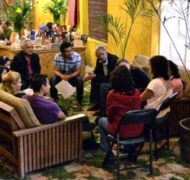Ruth and Parables: Small Group Leaders Guide Week 8
Small Group Study / Produced by partner of TOW
This content is part of the Ruth and Parables curriculum, an 11-week integrated sermon and small group series on faith and work.
Topic 1 – Seeing your life as it really is
“One Person’s Take on Life Stages”
- Identity – Who am I? Who am I becoming?
- Goals, Place, Community – What will I do with my life, and with whom will I do it?
- Order and Responsibility – How do I manage my responsibilities and commitments and keep myself renewed?
- Uncertainty – How do I feel about the person I have become? How do I face my limitations?
- Change and Intentionality – What is my vision for the second half of my life? Will I continue to grow in depth and effectiveness, or have I reached a ceiling in life?
- Diminishing – Is there still a place for me? What does a person of my age and experience bring to the table?
- Grieving and Rearranging – How do I handle the inevitable sense of loss in my life?
- Legacy, Death, Remembrance – How do I face obscurity? What can I offer a world that seems to see me as obsolete? End of life issues.
From Steve’s sermon: “The former CEO Jack Welch had this famous bit of advice, which is to face reality as it is, not as it was or you wish it to be….Do we need to resist these stages and questions, distracting ourselves from their challenges? Do we grit our teeth and make the best of things, pushing off the inevitable emotional funk? Or can faith unlock a particular form of ingenuity, so we become bold and creative with our next steps, making the most of our current lot in life?
Questions
- Do you agree that the stages of life idea is a helpful way to make sense of what’s happening in your life this week/month/year?
- Which stage are you in?
- What do you need to see about yourself or about the world as it is, not as you wish it was? Are there any outdated or false perceptions that you may be clinging to but are keeping you stuck?
Topic 2 – Boldness in this stage of your life
Read Ruth 3:1-18
From Steve’s sermon: “I think one way of seeing what’s going on is that Ruth and Naomi are really owning their life stages and deciding to do something about their questions, and they’re letting their questions spur them to action!... If nothing else, you have got to say these are some bold women! There’s none of this, ‘I would really love it if that guy would notice me and get his stuff together and ask me out.’ Forget that, she hops into his bed in the middle of the night and asks him to marry her!”
Questions
- What do you think of Naomi urging her daughter-in-law to go sleep with (or perhaps even “sleep” with) Boaz, the man who was essentially her boss? Is “bold” the word you’d use?
- Ruth’s boldness seems a combination of seeing things as they really are, determination (or desperation), and divine inspiration. Do you agree?
- What kind boldness might be appropriate for this particular stage of your life? Something that wasn’t appropriate before, and might not be later. Is there a combination(s) of perception, determination and inspiration bubbling up in you in this stage of your life?
Topic 3 – Investing courageously in this stage of life
Read Matthew 25:14-30
From the Theology of Work Bible Commentary: “God has given each person a wide variety of gifts, and he expects us to employ those gifts in his service. It is not acceptable merely to put those gifts on a closet shelf and ignore them. Like the three servants, we do not have gifts of the same degree. The return God expects of us is commensurate with the gifts we have been given. The servant who received one talent was not condemned for failing to reach the five-talent goal; he was condemned because he did nothing with what he was given. The gifts we receive from God include skills, abilities, family connections, social positions, education, experiences, and more. The point of the parable is that we are to use whatever we have been given for God’s purposes. The severe consequences to the unproductive servant, far beyond anything triggered by mere business mediocrity, tell us that we are to invest our lives, not waste them.”
From Steve’s sermon: “We think that with the most precious things in life – our careers, our kids, our dreams, our hopes to be partnered, our legacy, whatever – that the most important thing is that we hold on to what we have and that we don’t screw it up. But Jesus tells this story and flips that assumption on its head. He says, being afraid of screwing up is the worst thing to do. And maybe he gives the master such an over the top reaction (to the third servant) to shock us out of our assumptions here. The most important thing isn’t not screwing up, the most important thing is faith, is movement, is courage…. Every person who tries in these stories wins. Every person. It’s like you can’t lose when you try in faith, or if you lose, it just doesn’t matter.”
Questions
- What gifts are you finding you have in this stage of your life? Do they seem greater than in earlier stages, or less? Is the pattern of your gifts shifting, e.g, personal abilities vs. relationships vs. social positions vs. physical or financial resources?
- Are the investments you’re making with these gifts appropriate for this stage of your life? Have you changed your investments as your gifts, needs, and desires change in moving from one stage of life to another?
- What courage do you need in this stage of your life? What courage have you exercised that God might be proud of you for?









